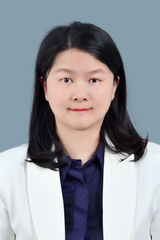
Tel: +86 (755) 2603-6405
Email: lixm@sz.tsinghua.edu.cn
Address: Room 203-1, Information Building
Li Xiangming is an Associate Professor in the Division of Social Science & Management, and has joined Tsinghua SIGS since 2004 (formerly "Graduate School at Shenzhen, Tsinghua University"). Prof. Li has been teaching courses to full-time students from both master and doctoral programs in the areas of English language, business communication, academic writings and publications, and expressions in professional settings. She also engages herself in the research of educational technology in tertiary settings.
2001-2003: M.A., Instructional Media and Design, University of Central Florida, Orlando, FL, U.S.
2000-2001: Ph.D. Candidate, Leadership in Higher Education, University of Knoxville, TN, U.S.
1997-2000: M.A., Linguistics and Applied Linguistics, Central South University, P.R.China
1993-1997: B.A., English Language and Literature, Xiangtan University, P.R.China
Past and current courses include :
1. English Courses for master students
2. Ph.D. English for doctoral students
3. Business Communication for Finance students
4. Professional Development and Expressions for both master and doctoral students
5. Academic Writings and Publications
Prof. Li’s research interests include mobile learning and instructional design in higher educational settings and EFL teaching. She is currently focusing on the emotional and cognitive loading state of individual learners in technology-assisted learning settings, especially in tertiary education.
1. Empirical study and Data Mining of ESL Blended Learning assisted by Mobile Apps of Rain Classroom (RMB¥60,000) Role: Principal Investigator
Online Education Center, Ministry of Education. Online Education Research Program, 2017YB143, 2017.1- 2018.3.
2. Exploring the Humor and Language, (RMB¥20,000) Role: Principal Investigator
Graduate School at Shenzhen, Tsinghua University, Initiative Scientific Research Program, 2010.1 - 2012.12.
Journal Articles
[1]. Xiangming, L.*, & Song, S. (2018). Mobile technology affordance and its social implications: a case of “rain classroom”. British Journal of Educational Technology. 49 (2), 276-291. doi:https://doi.org/10.1111/bjet.12586( SSCI,JCR Q1)
[2]. Xiangming, L.*, Zhang Chengping, Yuan Bo. An Experimental Study of the Application of Rain Classroom – Elucidating the Fundamental Rules of the Connectivism Learning Theory. Modern Educational Technology, 2017, 27(5):40-45.(Cites 38,retrieved from CNKI 2020-04-15)CSSCI
New Course
Opened a new course entitled “Language and Humor”
In International Journals
[1]. Xiangming, L., Liu, M. *, & Zhang, C. (2020). Technological impact on language anxiety dynamic. Computers & Education.(in press) doi: https://doi.org /10.1016/ j.compedu. (SSCI,JCR Q1)
[2]. Xiangming, L.*, & Song, S. (2018). Mobile technology affordance and its social implications: a case of “rain classroom”. British Journal of Educational Technology. 49 (2), 276-291. doi: https://doi.org/10.1111/bjet.12586( SSCI,JCR Q1)
[3]. Liu, M., & Xiangming, L.* (2019). Changes in and Effects of Anxiety on English Test Performance in Chinese Postgraduate EFL Classrooms. Education Research International, 2019,1-11. doi: 10.1155/2019/7213925. ( ESCI)
[4]. Xiangming, L.*, & Yang, G. (2019). Factors impacting student choice of satellite campus: A comparison between engineering and non-engineering at postgraduate level. Journal of Educational Research and Reviews, 7(7), 149-154. doi:10.33495/jerr_v7i7.19.132.
[5]. Xiangming, L., & Brand, M*. (2009). Effectiveness of music on vocabulary acquisition, language usage, and meaning for mainland Chinese ESL learners. Contributions to Music Education, 36(1), 73-84. (Cites 117, retrieved from Google Scholar 2020-04-15)
[6]. Xiangming, L.*, & Brand, M. (2009). Empirical study of gender performance in peer-to-peer talk in ESL class. Teaching English in China (now “Chinese Journal of Applied Linguistics”), 32(4), 115-126.
In Chinese Journals
[1]. Xiangming, L.*,Sun Chunliu,Dong Yuhan. Chinese Students’ Choice in Transnational Higher Education at the Postgraduate Level: Expanding the Push-Pull Factor Theory. Tsinghua Journal of Education, 2017, 38(3):108-112. CSSCI
[2]. Xiangming, L.*, Zhang Chengping, Yuan Bo. An Experimental Study of the Application of Rain Classroom – Elucidating the Fundamental Rules of the Connectivism Learning Theory. Modern Educational Technology, 2017, 27(5):40-45.(Cites 38,retrieved from CNKI 2020-04-15)CSSCI
[3]. Xiangming, L.*, Li Guangyu. Learning Issues and the Strategies in Network-Based Settings. Journal of Academic Degrees and Postgraduate Education, 2009, (7):46-48. CSSCI
[4]. Xiangming, L.*. Integrating ADDIE Instructional Design Models into Foreign Language Teaching. Modern Educational Technology, 2008(11):75-78. (Cites 79,retrieved from CNKI 2020-04-15)CSSCI
[5]. Xiangming, L.*. Reorienting the Teacher-Student Roles in Learning Activities- From the Perspectives from Communicative Language Teaching and Constructivism,Tsinghua Journal of Education,2009S,54-57. CSSCI
[6]. Yuan Bo*,Zhao Haimei,Zhang Chengping, Xiangming, L. . The Visual Analysis of Postgraduate’s English Learning Behavior Based on Rain Classroom. Modern Educational Technology, 2018, 28(5):68-74. (Cites 23,retrieved from CNKI 2020-04-15)CSSCI
International Conferences
[1]. Xiangming L.*. Precursors of Redesigning Pedagogy: From Technology Affordance Perspectives
27th Annual International Conference Empowering Educational Research to Promote Equity: Generating Data-Driven Conversations to Improve Educational Practice, Toronto, Canada, April 4th-5th, 2019
[2]. Xiangming L.*, Shuaiguo Wang. Are Students Still Embracing New Technology? A Case of Rain Classroom. Chang, M. et al. (Eds.). (2017). Proceedings of the 21st Global Chinese Conference on Computers in Education (GCCCE 2017), Beijing, P.R.China, June 3rd-6th, 2017
[1]. Li Xuening*, Xiangming L., Song Menghong. Knowledge Representation of Systemic Functional Linguistics in Natural Language Processing. Shanghai: Shanghai Jiaotong University Publishing House, 2018.
[2]. Xiangming L. (among Editorial Board). New Century English-to-Chinese College Dictionary. Shanghai: Shanghai Foreign Language Education Publishing House. 2010.
1. Educator Excellence in Smart Technology, Awarded by Online Education Office, Ministry of Education, 2018
2. “Blended Learning of Postgraduate English assisted by Mobile Learning Apps of Rain Classroom
2nd Prize, Tsinghua University Teaching Achievements Awards, 2019
3. “Mobile Technology Affordance and Its Social Implications: A Case of Rain Classroom
3rd Prize in Research Paper Excellence, Shenzhen Municipal Research Excellence Awards in Philosophy and Social Science, 2019
4. Top Downloaded Articles among Top 20 in British Journal of Educational Technology from 2017 to 2018, Wiley Publishing
5. “English Language for master students” course electronic PPT slides and affiliated learning materials
Electronic Teaching Materials Excellence in Smart Teaching Award, Online Education, Ministry of Education, 2018
6. Teaching Excellence Award, Tsinghua University, 2016
7. “Exploring the Innovation and Entrepreneur Education and Talents Cultivating”
2nd Prize in Research Paper Excellence, Tsinghua University Higher Education Association, 2015
8. “Exploring the international graduate students based on the collaborations between Shenzhen and Hong Kong.”
2nd Prize in Tsinghua University Teaching Achievements Awards, 2010